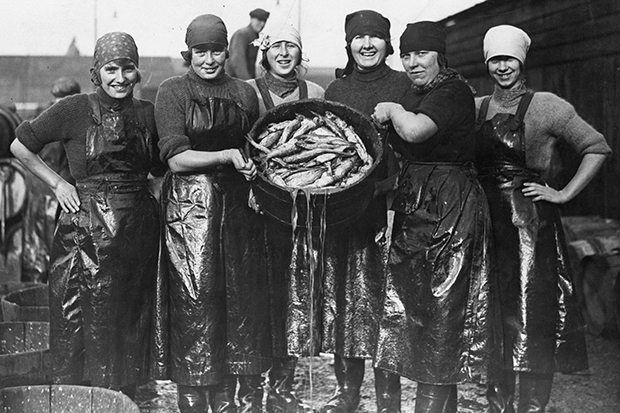Fish stories come in two varieties: the micro-version of a hundred riverside bars, blokeish boastings of rod-and-line tussles with individual fish in which man and beast are fairly evenly matched. Then there is the macro-version, the one that tells of the fate of entire stocks — the cod of the Grand Banks, the European hake, the bluefin tuna of the Mediterranean, the haddock of the Atlantic, the whale everywhere. In this version, technology and greed have the upper hand and the narrative invariably moves from scenes of boundless plenty to ones of catastrophic scarcity.
Donald S. Murray’s Herring Tales is one of these. As a native of Lewis, a Gaelic speaker, he recalls Stornaway crammed with herring boats; you could cross the harbour on their decks. He cites a 15th-century document which tells of two Swedish fishing villages employing 5,000 people in the herring season. A few centuries earlier, the waters off southern Sweden were said to be so thick with herring that boats sometimes became stuck in them.
The Scottish fishery reached its peak in the early years of the 20th century. At that point vast shoals of herring still shifted across the north Atlantic, to provide a living for coastal communities from the Hebrides to Shetland, Iceland to Scandinavia (further south, the herring’s cousins — sardines and pilchards — were doing the same). Just before the first world war, up to three million barrels of salted herring passed annually through the ports and harbours of Scotland.
But the herring, as Murray explains, is a fickle fish. It stopped coming to the Baltic long before the modern era for reasons which are not understood. It has always had the habit of appearing in certain places one year in vast numbers, bringing bounty to all, then disappearing. Traditionally, such punitive patterns indicated divine retribution. In 1703 Martin Martin wrote: ‘It is a general observation all Scotland over, that if a quarrel happen on the coast where herring is caught, and that blood be drawn violently, then the herring go away.’ Adultery had the same effect.
The collapse of herring stocks in the 1970s had a more prosaic cause. Use of highly efficient trawl nets had been growing; shoals were being targeted further and further out to sea. In 1978, stocks imploded and the Scottish fishery was closed. By the time it reopened, Britons had lost their taste for herring; the market has never returned.
Murray is concerned less with the vicissitudes of the herring itself than the profound effect it has had on us, its predators. He quotes the Glaswegian comic Ivor Cutler who reckons that Scotland ‘gets its brains from the herring’. Literature, folk music, Gaelic idiom, the pattern of settlement and industry from the Isle of Man to Norway are all marked with the influence of herring. When the industry was at its height, the herring had a persistence that was equally hard to escape: the ‘herring girls’ who processed the fish had to wash their hair six times on a Saturday night to rinse out the smell. The story goes that a Hebridean woman was once brought some sausages by her visiting grandchildren, fed up as they were with plates of unremitting herring. When she served up the sausages, they were unrecognisable: ‘By the time I gutted them and took off their heads and tails, that’s all there was left.’
Herring Tales offers a fascinating view of the coastal cultures of northern Europe, of how a 12-inch fish has affected human activity there for hundreds of years. The story is told with great charm, and tinged with a spirit of loss and yearning so characteristic of the Western Isles that you can’t help wondering whether that too might be the by-product of a diet of herring.
Got something to add? Join the discussion and comment below.
Get 10 issues for just $10
Subscribe to The Spectator Australia today for the next 10 magazine issues, plus full online access, for just $10.
Available from the Spectator Bookshop, £14.99 Tel: 08430 600033
You might disagree with half of it, but you’ll enjoy reading all of it. Try your first month for free, then just $2 a week for the remainder of your first year.














Comments
Don't miss out
Join the conversation with other Spectator Australia readers. Subscribe to leave a comment.
SUBSCRIBEAlready a subscriber? Log in